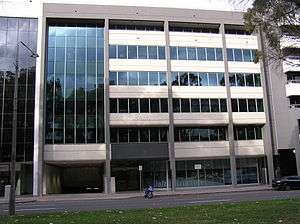Australian Transport Safety Bureau
 | |
| Agency overview | |
|---|---|
| Formed | 1 July 1999[1] |
| Jurisdiction | Government of Australia |
| Headquarters | 62 Northbourne Avenue Canberra ACT |
| Employees | 118 (est for 2013–14)[2] |
| Agency executive |
|
| Website |
www |


The Australian Transport Safety Bureau (ATSB) is Australia’s national transport safety investigator. The ATSB is the federal government body responsible for investigating transport-related accidents and incidents within Australia. It covers air, sea and rail travel. The ATSB is an independent Commonwealth Government statutory agency. The ATSB is governed by a Commission and is entirely separate from transport regulators, policy makers and service providers. Its headquarters are located in the 62 Northbourne Avenue building in Canberra, Australian Capital Territory.[3] It has field offices in Adelaide, Brisbane, and Perth. It has about 110 employees, including about 60 investigators of aviation, marine, and rail accidents and incidents.[4]
History
The Australian Transport Safety Bureau was formed on 1 July 1999. It combined the Bureau of Air Safety Investigation (BASI), Marine Incident Investigation Unit (MIIU) and parts of the Federal Office of Road Safety (FORS).[1] Until the ATSB railway safety had been the responsibility of each state government.
Bureau of Air Safety Investigation
The Bureau of Air Safety Investigation (BASI) was previously the Air Safety Investigation Branch (ASIB) of the Australian Department of Civil Aviation (DCA) and Department of Aviation (DoA). ASIB became BASI, an operationally independent unit of DoA, in 1982. In 1987 BASI was transferred to the Department of Transport and Communications (DoTaC) when DoA was abolished and absorbed (with other Departments) into DoTaC. The predecessor to ASIB, the Air Accident Investigation Committee was formed in 1921 "investigate all civil and military aircraft accidents that the Committee deemed advisable". When DCA was formed in 1938 investigation of air safety came within its purview. The specialist Air Safety Investigation Branch was formed in the 1950s.[5]
Marine Incident Investigation Unit
The Marine Incident Investigation Unit (MIIU) was created on 1 January 1991 under the direction of the Inspector of Marine Accidents, a statutory position. Previously a model was adopted in 1921 via amendment to the Navigation Act 1912. It was based on British law and practices dating to 1850.[1]
Road Safety Branch
Between July 1999 and March 2008 Federal government initiatives dealing with road safety were primarily within the ATSBs responsibilities in the Road Safety Branch (RSB). The RSB later became part of 'The Infrastructure and Surface Transport Policy Division' of the Department of Infrastructure, Transport, Regional Development and Local Government.[6]
ATSB operations
The ATSB contributes to transport safety by independently investigating, analysing and openly reporting on transport safety matters. All ATSB investigations are "no blame" – the emphasis is on learning to improve future safety.
The ATSB is entirely separate from transport regulatory authorities such as the Civil Aviation Safety Authority (CASA), the Australian Maritime Safety Authority (AMSA) and state and territory rail safety regulators, and also from service providers such as Airservices Australia and the Australian Rail Track Corporation (ARTC).[1]
ATSB transport safety investigations exercise statutory powers delegated by the Chief Commissioner in accordance with the provisions of the Transport Safety Investigation Act 2003 (TSI Act). The TSI Act allows the ATSB to investigate transport safety matters in the aviation, marine and rail transport modes within the Australian Government's constitutional jurisdiction and to release transport safety information, including investigation reports that detail the findings and significant factors that led to a particular transport safety occurrence.
Under the provisions of the TSI Act, ATSB investigators may interview anyone involved directly or indirectly in a transport safety occurrence. A comprehensive regime of provisions within the TSI Act is in place to maintain the confidentiality of, and legal protection for, a range of sensitive safety information gathered by ATSB investigators.[7]
Other countries
- National Transportation Safety Board - United States
References
- 1 2 3 4 Batt, Richard, ed. (21 December 2009). PAST PRESENT FUTURE, The Australian Transport Safety Bureau (pdf). p. 1. ISBN 978-1-921095-87-0. Retrieved 24 February 2015.
- ↑ Australian Government. "Budget Paper No. 1". 2013-14 Commonwealth Budget. Statement 6: Expenses and Net Capital Investment: Australian Government. Archived from the original on 24 September 2013.
- ↑ "Contact Us." Australian Transport Safety Bureau. Retrieved January 2011. "Canberra (Central Office) Street address: 62 Northbourne Avenue Canberra ACT 2601"
- ↑ "Overview of the ATSB." (Archive) Australian Transport Safety Bureau. Retrieved on 4 September 2012.
- ↑ Batt, Richard, ed. (21 December 2009). PAST PRESENT FUTURE, The Australian Transport Safety Bureau (pdf). pp. 27–43. ISBN 978-1-921095-87-0. Retrieved 24 February 2015.
- ↑ Batt, Richard, ed. (21 December 2009). PAST PRESENT FUTURE, The Australian Transport Safety Bureau (pdf). pp. 45–46. ISBN 978-1-921095-87-0. Retrieved 24 February 2015.
- ↑ Batt, Richard, ed. (21 December 2009). PAST PRESENT FUTURE, The Australian Transport Safety Bureau (pdf). p. 5. ISBN 978-1-921095-87-0. Retrieved 24 February 2015.


